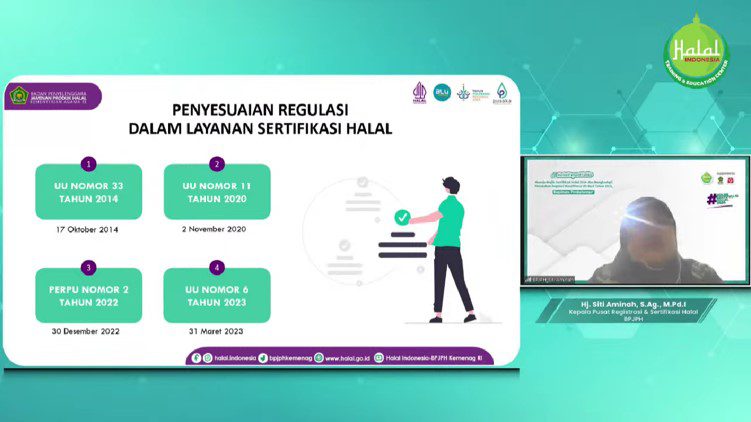Regulation Updates in Halal Certification Services in Indonesia

Home » Regulation Updates in Halal Certification Services in IndonesiaRegulation Updates in Halal Certification Services in Indonesia – Halal certification standards and regulations in Indonesia are issued by BPJPH and known as the Halal Product Assurance System (SJPH). These halal standards and regulations must be understood by all business actors. This is essential for those who want to certify their products as halal.
Overview of Indonesia Halal Product Assurance System (SJPH)
Indonesia Halal Product Assurance System (SJPH) regulates matters related to the halal certification process, starting with human resources and their competencies, halal service rates, halal product guarantee standards, and international cooperation with halal related institutions around the world.
In Indonesia itself, halal regulations began with the issuance of Law on Halal Product Guarantee No. 33 of 2014, which is currently undergoing significant changes. For example, with the formation of the Halal Product Fatwa Committee after the issuance of Law No. 6 of 2023, What will the changes be like? Let’s see together!
Changes in Indonesia Halal Regulations After Law No. 6 of 2023
Law No. 6 of 2023, which has been ratified, is an important part of improving halal regulations in Indonesia. In its journey, the adjustment of halal regulations in Indonesia has changed four times. The first change was in Law Number 33 of 2014, followed by Law Number 11 of 2020. Then, it was revised again in Perpu Number 2 of 2022. The most recent change occurred in Law Number 6 of 2023, which was passed on March 31, 2023.
There are several fundamental changes in Law Number 6 of 2023. One of them is the time for assistance in the halal product process. Another change is the establishment of a halal product fatwa committee. The law also regulates the determination of product halalness. Lastly, it introduces a new validity period for halal certificates.
Timeline for Self-Declared Halal Certification
The timeline for self-declared halal certification was not regulated in Law Number 11 of 2020. However, in Law Number 6 of 2023, it has been set for 12 working days. The process starts with 1 working day for the submission of the application to BPJPH.
Next, 10 working days are allocated for verification and validation by PPH Facilitators. After that, 1 working day is given for halal determination at the Fatwa Committee. Finally, the halal certification is issued by BPJPH.
Law Number 6 of 2023 also stipulates the establishment of a fatwa committee for halal products, which was not previously established in Law Number 11 of 2020. The fatwa committee for halal products is a team formed and responsible to the Minister of religious affair, consisting of elements of scholars and academics. This halal fatwa committee must be created within one year of the law’s passage.
Changes in Law Number 6 of 2023 also have an impact on MUI. In Law Number 11 of 2020, MUI is tasked with establishing halal decisions which are carried out through halal fatwa sessions. However, under Law Number 6 of 2023, MUI, Provincial MUI, Regency/City MUI, and Aceh Deliberative Council can also determine halal decisions.
Changes in the Halal Fatwa Court Process
The halal fatwa court has also undergone major changes; under Law Number 11 of 2020, both regular and self-declared halal certification fatwas are carried out by the MUI fatwa commission. But in Law Number 6 of 2023, only regular submissions for halal fatwa hearings are carried out by the MUI fatwa commission, and the commission must determine the product’s halalness no more than 3 working days after receiving the report from LPH. If the time limit is exceeded, the decision will be made by the Halal Product Fatwa Committee. The determination of product halalness by the committee must be completed within 2 working days.
For self-declaration, halal fatwa hearings will only be carried out by the halal product fatwa committee and carried out for only 1 working day.
With this change, it is expected to accelerate the process of product halal certification.
New Validity Term of Halal Certifications
The validity term of halal certifications is the final major modification in Law Number 6 of 2023. According to Law No. 11 of 2020, halal certifications are only valid for four years and must be renewed. Meanwhile, according to Law Number 6 of 2023, the validity term of the halal certificate begins with the issuing of the BPJPH. It remains valid as long as there is no change in the composition of the components and/or PPH. The validity period of this halal certificate is a presidential mandate.
This change in the halal regulation was made to support the target set for 2024. All products circulating in Indonesia must be halal certified by that year. It is hoped that this change will simplify the certification process. Business people and businesses will find it easier to certify their products.
IHATEC, as a halal training institution, is ready to help business people to be able to certify their products halal with competent training and assistance.
- Email: info@ihatec-mr.com
- WhatsApp: +62 812-9059-4266
- Website: www.ihatec-mr.com


